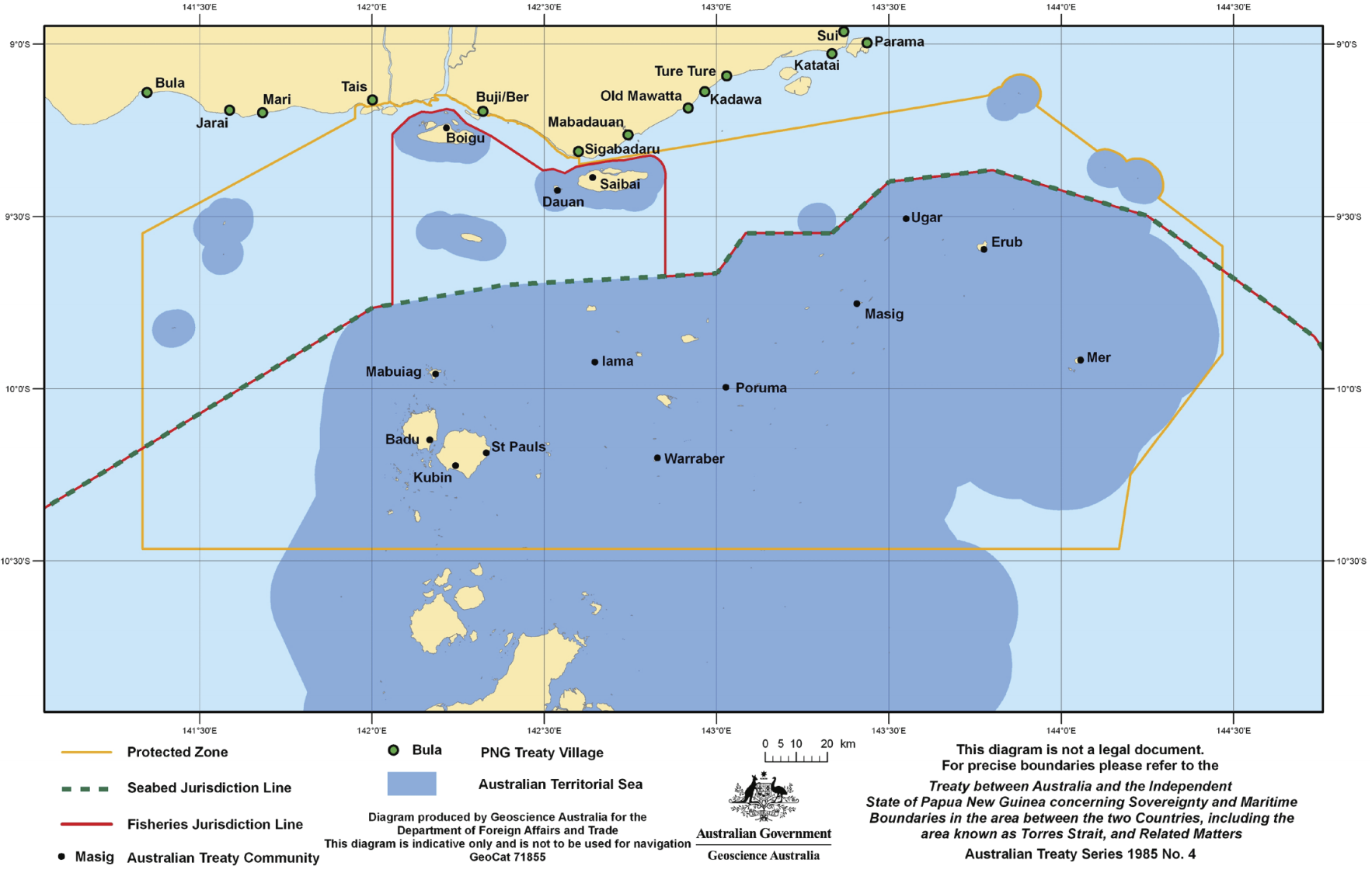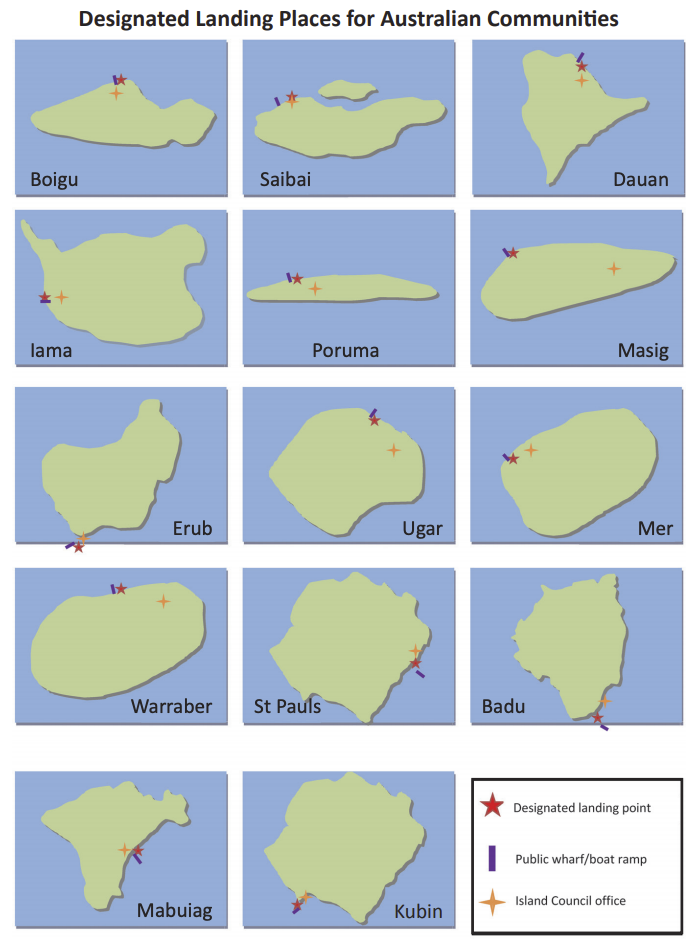A ban on cross-border travel for traditional purposes under the Torres Strait Treaty is in place until further notice.This ban is pursuant to Article 16 of the Treaty between Australia and the Independent State of Papua New Guinea concerning Sovereignty and Maritime Boundaries in the area between the two Countries, including the area known as Torres Strait, and Related Matters (Australian Treaty Series 1985 No 4). |
About the Treaty:
The Torres Strait Treaty is between Australia and Papua New Guinea. It was signed in December 1978 and became active in February 1985. The treaty concerns matters of sovereignty and maritime boundaries in the area known as the Torres Strait, the Protected Zone also protects the land and sea environment of the Torres Strait.
The Treaty allows free movement (without passports or visas) of tradtional inhabitants between Australia and Papua New Guinea for traditional activities in the Protected Zone and nearby areas.
Australian Traditional Inhabitants:
Australian traditional inhabitants come from the Torres Strait Island Regional Council communities of Badu, Boigu, Poruma, Erub, Dauan, Arkai (Kubin Community on Mua Is.), Wug (St Pauls Community on Mua Is.), Mabuiag, Mer, Saibai, Ugar, Warraber, Iama and Masig. They can make traditional visits to the PNG Treaty Villages and travel north as far as the 9 degrees South latitude (just north of Daru).
Papua New Guinea Traditional Inhabitants:
PNG traditional inhabitants come from the coastal villages of Bula, Mari, Jarai, Tais, Buji/Ber, Sigabadaru, Mabadauan, Old Mawatta, Ture Ture, Kadawa, Katatai, Parama and Sui (the 13 PNG Treaty Villages). They can make traditional visits (free movement without passports) into the Protected Zone. PNG traditional inhabitants can travel south into Australia as far as the 10 degrees 30 minutes South latitude (near Number One Reef).
The Torres Strait Protected Zone (TSPZ):
The Protected Zone is an area of the Torres Strait recognised by Australia and Papua New Guinea as needing special attention.
The main reason for the Protected Zone is so that traditional inhabitants can carry on their traditional way of life. For example, traditional people from both countries may move freely (without passports or visas) for traditional activities within the Protected Zone. The formation of this zone has also helped to preserve and protect the land, sea and air of the Torres Strait, including the native plant and animal life.
Guidelines for Traditional Visitors travelling under the Torres Strait Treaty:
While on a Traditional Visit you must:
• Obey national laws and local laws and customs.
• Land your boat only at the proper place and report to authorities before entering the community.
• Respect the traditional way of life – do not disrespect communities by littering, getting drunk, being noisy, or using betel nut (buai) in public places.
Free Movement and Traditional Activities:
• Free movement is only for traditional activities – that is, "activities performed by the traditional inhabitants in accordance with local tradition" (Article 1K of the Treaty). Traditional activities include gardening, collection of food, hunting, traditional fishing, religious and secular ceremonies or gatherings for social purposes (for example, marriage celebrations and settlement of disputes), and barter and market trade (Article 1K of the Treaty).
• Traditional visits do not include activities that are not traditional. Visits for health treatment, attending court cases, shopping at the store, picking up deliveries from the barge, baby sitting, working or accessing money from the ATM are not considered traditional activities.
• Free movement is only for Torres Strait Islanders living in the Protected Zone and for Traditional Inhabitants from the PNG Treaty Villages. PNG nationals from Treaty villages who become Australian citizens or permanent Australian residents and live in the Protected Zone can still make traditional visits to the PNG Treaty villages.
• Traditional visitors can only travel by dinghy or canoe, not by aircraft.
• The Treaty bans commercial activity, business dealings and working for money during traditional visits (e.g. cray fishing from a licensed Australian cray boat, selling artifacts to commercial operators, paid domestic assistance). Selling goods to non-traditional inhabitants is not permitted under the Treaty. Selling goods in the knowledge that they may on-sold is also not permitted under the Treaty.
• Traditional movement can be restricted for disease outbreaks, resource limitations (for example water shortages), security or quarantine concerns (Article 16 of the Treaty). Bans will only operate if required and reasonable. If you think a ban is not fair or reasonable, contact the Border Liaison Officer (BLO) in Daru and/or the Treaty Liaison Officer (TLO) in Thursday Island.
• People who do not follow Australian laws, customs or Treaty procedures, or who otherwise may be undesirable, can be banned from traveling under the Treaty (Article 16 of the Treaty) Arrangements for Traditional Visits
• Traditional Inhabitants must get a prior advice notice requesting a visit signed by the registered signatory. The registered signatory from one village cannot sign a pass for someone from another village. The signed prior advice notice requesting permission to visit must be sent to the relevant community before visiting. Do not travel until you receive approval (signed pass) back from the community you wish to visit. Registered Signatories are;
(a.) For Australia; the elected Councillor of the applicable Torres Strait Island Regional Council community.
(b.) For Papua New Guinea; the Village Chairman.
• Consistent with local tradition and custom, wives from non-Treaty villages can make traditional visits with their husbands if the man is from a Treaty Village. Husbands from non-Treaty villages cannot make traditional visits if they are married to a woman from a Treaty Village.
• Children must travel with their parents or legal guardians. This helps to keep children safe.
• Do not bring non-traditional or non-approved objects to trade.
• Make sure you have enough fuel to travel back home. Always travel in daylight hours for your own safety. Make sure you carry safety gear on your boat (EPIRB, marine radio, flares, V-Sheet, Personal Flotation Devices – PFD Type 1, fire fighting devices, navigation equipment, bilge pump for boats over 5m, bucket for bailing water, anchor, oars or paddles, drinking water).
• If you stay longer than the approved period on your pass without the approval of the community then you become an 'overstayer' and you might be asked to leave or you might be forcibly removed. Overstaying puts lots of pressure and stress on communities. If you regularly overstay your visit, you might be banned from making future visits.
Special Instructions for Traditional Inhabitants travelling to Australia:
• You will be turned away and prevented from entering Australia if you;
(a.) Bring non-Treaty people into the Torres Strait.
(b.) Travel with children without their parent or legal guardian on board.
(c.) Travel with a person banned from making traditional visits (Section 16).
• You must check in immediately with Immigration Movement Monitoring Officers (MMOs) and Quarantine.
• You must land and depart from the designated ramp or wharf.
• Different islands have different rules for lengths of visits. Please respect these rules. All islands have a maximum visit of three weeks. Your approved visit might be less than three weeks.
• If you need to stay longer than your pass (for example if the weather is bad) see the Immigration Movement Monitoring Officer (MMO) straight away. The community might agree to extend your stay for a valid reason (for example bad weather).
• If you commit a crime during a traditional visit you will be dealt with under Australian law.
Traditional Fishing:
• Traditional fishing means "the taking, by traditional inhabitants for their own or their dependants' consumption or for use in the course of other traditional activities, of the living natural resources of the sea, seabed, estuaries and coastal tidal areas, including dugong and turtle" (Article 1L of the Treaty).
• Torres Strait may have community management plans in place for turtle and dugong. traditional visitors must comply with these plans, and should contact community leaders, local Native Title Body representati ves or the local Island Division of the Torres Strait Island Regional Council for information before hunti ng turtle and dugong in a new location.
• Nets must not be used to take dugong.
• Bag limits apply for tropical rock lobster (crayfish) of three per person or six per boat.
Biosecurity and Quarantine:
• Your belongings will be checked on entry to Australia to prevent exotic pests and diseases coming into the Torres Strait.
• Do not bring live animals including birds, live plants, fresh fruit and vegetables, meat, feathers, eggs and other animal products into the Torres Strait.
• Trade may be restricted for: kundu drums made from monitor lizard (goanna) or python skin, woven fi bre articles containing Cuscus fur, beads made of seeds, wood carvings, and giant clam and queen conch shells. These items may be protected under the Convention on International Trade in Endangered Species of Wild Fauna and Flora (CITES), therefore permits are required for movement between countries.
Endangered Species:
• The Treaty gives Australia and PNG the right to implement measures regarding flora and fauna which are or might become threatened with extinction or which is protected under international law (Article 14 of the Treaty). PNG and Australia have signed an international agreement, the Convention on International Trade in Endangered Species of Wild Flora and Fauna (CITES), which regulates international trade to ensure it does not endanger wildlife.
• Dugong and turtle are among the species covered under CITES. This means you are not permitt ed to take or trade dugong or turtle specimens and their products (dugong or turtle meat, dugong bone or tusk, or turtle shell) across the border. Not from PNG into Australia. Not from Australia into PNG. If you do bring dugong or turtle products (including carvings) into the Torres Strait from PNG these items can be seized by Australian authorities.
More Information:
| Guidelines for traditional visitors travelling under the Torres Strait Treaty. |
Download the guidelines here |
| Full text of the Torres Strait Treaty. |
View the full Treaty text here |
| For more information about the Treaty, visit the Department of Foreign Affairs and Trade website. |
Visit the DFAT - Torres Strait Treaty Site |


